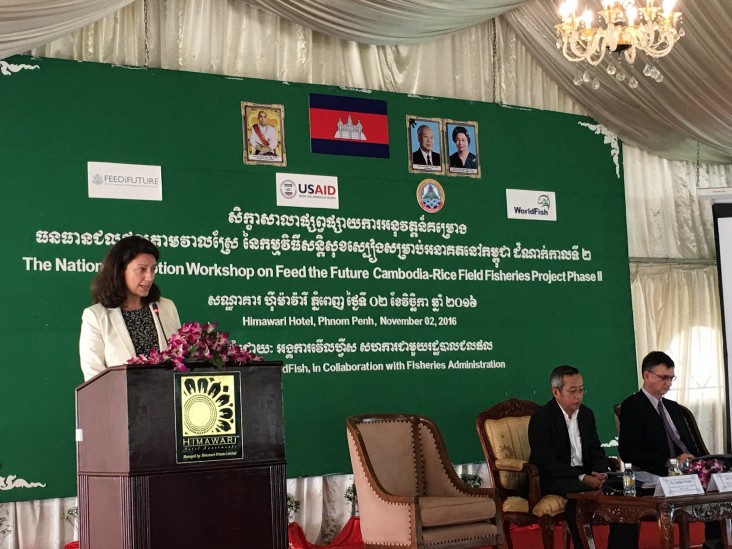
(as prepared for delivery)
- Good morning Your Excellency Eng Cheasan
- Distinguished guests, ladies and gentlemen.
It is my great pleasure to be with you this morning.
This workshop is an excellent opportunity for WorldFish, the Fisheries Administration, and USAID to share with the public information about this important project. The Rice Field Fisheries Project is another example of the U.S. government’s continued commitment to help Cambodia reach three significant milestones in its economic development. The first is a continued reduction in poverty. The second is the elimination of malnutrition. And the third is the protection of Cambodia’s rich natural resources. We are pleased that this program is designed to help Cambodia accomplish all three.
Over the last decade, Cambodia has succeeded in halving its poverty levels, exceeding its targets for reducing malnutrition, and maintaining a steady GDP growth rate of more than 7 percent. All of this has contributed to Cambodia achieving low-middle income country status.
Many Cambodians live in rural areas and earn their incomes from agriculture. They feed their families with the rice, fish, and vegetables that can be grown and harvested in their villages. And, although Cambodia has seen a significant decrease, the affects of malnutrition are still evident in its underweight and stunted children.
The first phase of the Rice Field Fisheries project provided strong evidence that fish play a significant role in improving nutritional status especially among Cambodia’s rural poor. What we also realized was the extent to which fisheries are very vulnerable to climate change. I believe many of you here today personally felt the impact of this season’s prolonged drought followed by sporadic rains. This drought not only caused a lack of irrigation water but also limited the availability of water for drinking, cooking, and washing.
These effects are particularly felt by the poor and vulnerable populations who are most dependent upon natural resources and ecosystem services. For this reason, President Obama’s Climate Action Plan mobilizes all countries to act together to ensure a clean, stable environment. In his words, “For the sake of our children and our future, we must do more to combat climate change.” USAID Cambodia has responded by providing support to Cambodian communities through projects such as the Rice Field Fisheries Enhancement Project Phase I - and now - Phase II.
I am particularly pleased to state that this project is completely designed with Fisheries Administration and complements their Strategic Planning Framework. Together, we have created a unique project that aims to improve food and nutrition security of poor and vulnerable households in the Tonle Sap floodplain while also protecting its environment. More specifically, through the support of the Rice Field Fisheries Phase II project, we are expecting to see an annual increase of 50 kg of fish per hectare in the Project’s target area – which includes approximately 2 million hectares of rice in the Tonle Sap region. This equates to a total output of an additional 100,000 tons of fish per year.
With so many communities near the Tonle Sap dependent upon fish as their main source of protein, this project seeks to improve their food security and nutrition by providing an effective method for adapting to climate change and conserving the rich biodiversity in the rice field fisheries system.
I want to thank you all again for participating in this workshop, and I hope you have a productive and engaging dialogue.
I wish you many blessings.
Related Speeches
- Remarks by Polly Dunford, Mission Director, USAID Cambodia, Launch Event of Feed the Future Cambodia Harvest II
- Remarks by Christina Lau, Deputy Director, Office of Public Health and Education, USAID/Cambodia, Opening Ceremony of the Kick-Off Workshop for “One Health Workforce”
- Remarks by Veena Reddy, Deputy Mission Director, USAID Cambodia, EPIC Showcase







Comment
Make a general inquiry or suggest an improvement.